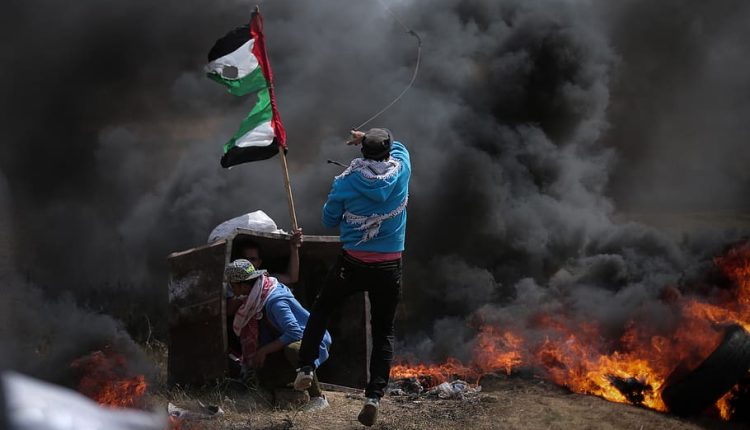Israel made these Palestinians homeless – not once but twice, even thrice – TRT WORLD
On the afternoon of May 13, days after Israel began bombarding the besieged Gaza, Ezdin Abu Hamada, 16, and his family, were glued to the TV screen in the living room of their two-storey house. Someone from Israel called his father with an ultimatum: ‘Get out of the building. It can be bombed.’
Tel Aviv says its missiles and artillery only targets Palestinian gunmen hiding in the densely populated areas. But what it often doesn’t talk about is the collateral damage the Israeli strikes have on the lives and homes of ordinary civilians.
Half an hour after the call to Hamada’s father, Israeli rockets and shells rained down on an apartment building located not far from Hamada’s house.
“We ran from our house and watched what happened from a few miles away. I saw all the destruction,” Hamada says.
“The building that was struck was squashed like a biscuit.”
The shockwaves and impact of the Israeli ammunition destroyed Hamada’s home as well. Walls came down, window glass shattered to pieces, rooms collapsed onto each other.
“Nothing was left standing there,” he says.
Afterwards, Hamada waded through the debris of his house, searching for anything that could be salvaged. My school books, my tablets, even clothes – everything was ruined. And I have exams coming up.”
In the recent Israeli assault on Gaza that began in early May, hundreds of Palestinians homes were partly damaged or completely destroyed, forcing more than a thousand people to live in temporary accommodations, with relatives or tents, says Salama Marouf, the director of Gaza’s government media office.
Hamada’s family of eight including his five siblings have moved into his grandfather’s home in the Sabra neighborhood in the heart of Gaza.
“We all live in one room. There’s no other to spare,” he says.
All over again
Losing a home like this is painful. Losing it twice can be traumatizing and that’s what Hamada is going through.
In 2014, when he was ten-years-old, Israel had carried out a brutal series of airstrikes in Gaza, killing 74 people.
That flare-up destroyed the Hamada family home. The attacks began in the night and went on for the whole day, he recalled in between sobs.
“At that time, I had no idea what was going on. I just heard heavy and constant bombing everywhere,” said Hamada. “I heard my family say the region had been bombed by tanks, artillery and jets, and that many people bled to death inside their homes because medical personnel couldn’t enter.”
With dead bodies strewn on the roads, Hamada says his family hopped on to a truck and moved to their grandfather’s home.
They lived like that for 5 years until his father bought a house in Deir al Balah neighborhood, from where they were displaced last month.
“We thought our new house was in a relatively safer neighbourhood.
I don’t know how long we will have to endure this,” says Hamada.
‘A second Nakba’
Intisar Muhanna, 95, went through what she says is a second Nakba– the forced expulsion of Palestinians in 1948 from the lands, which now make up Israel.
On midnight of May 12, the same day Hamada and his family looked at their home being bombed, Israeli warplanes targeted the 5-storey building where Muhanna had lived for 60 years.
“My husband built this floor by floor over the years. We lived there with her kids,” she says.
All that hard work, all those memories turned into a pile of debris within seconds.
When Muhanna says this was the second Nakba for her, she isn’t speaking figuratively. She literally lived through the horrid experience of the Nakba, known to the Palestinians as the ‘Catastrophe’.
She was 20-years-old when Israeli forces attacked Palestinian villages in 1948, driving out tens of thousands of Palestinians from their ancestral homes.
Muhanna had to leave al Masmyya, a village located some 41 km from Gaza, where she was born.
“They destroyed the town, they tore down the two mosques and schools and one tiny clinic. They built an Israeli settlement on top of them, changing the area’s historical characteristics,” Muhanna says.
In al Masmyya, she lived in a house that was surrounded by various types of trees.
“I was happy with the modest life we lived. We worked on the field and took care of animals and birds.”
Living in a tent
Samir Taha, 73, lives in a three-story building, along with 20 others, in Beit Lahia, a north eastern part of Gaza. They were all displaced after the building was destroyed in the recent conflict.
Taha’s son received a call from the Israeli army officer, telling him to vacate the building within 15 minutes. They ran out barefoot. They weren’t able to take anything along.
“Three missiles struck the home I lived in for 40 years, knocking it to the ground in an instant. I got married in this house and brought up my kids and my nephews in that place,” Taha said.
This was not the first time an Israeli assault targeted the building he lived in, forcing him and his family to run for their lives. They were displaced in 2012, 2014 and now in May 2023 during Israeli military raids.
“My family and I only had a few years to enjoy our new home which was rebuilt in 2017 after being destroyed in the 2014 offensive,” he added.
After the recent assault, Taha pitched a tent near the debris of his home. He intends to remain there with his family until the building is rebuilt – a repeat of a life under the open sky as they lived for several years after the 2014 Israeli aggression.
“It is my land, and my family and I will continue to rebuild the house every time they destroy it. Their wars will not frighten us or cause us to abandon the land.”

